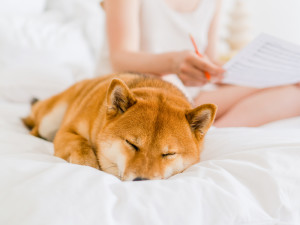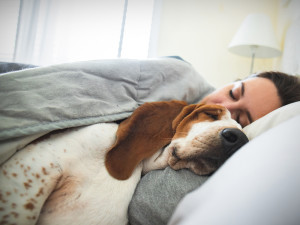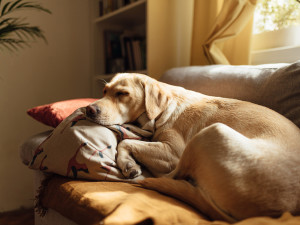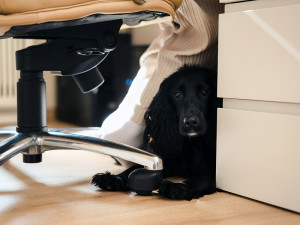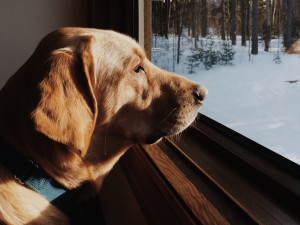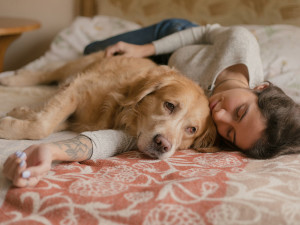Should You Wake Up Your Dog From a Dream?
Have you heard the saying “never wake a sleeping dog?” Let’s fact-check it.

Share Article
As pet parents, we’ve all probably heard the idiom “let sleeping dogs lie,” but where did it come from? Is it ever safe to do so, or are we better off leaving our dogs to bark in their slumber? According to Dr. Julia Albright, a veterinary behaviorist at the University of Tennessee, it’s best to leave a sleeping dog alone for the same reasons it’s best to let people sleep uninterrupted. That said, it’s not an absolute rule.
As someone whose dogs are often quite active in their sleep, I have no doubt that they dream, but it’s hard not to wonder what they dream about. When the little fluffy one is barking and pumping in his legs in his sleep, does that mean he’s chasing a squirrel? When my jumpier baby is twitching and whining with her eyes closed, is she having a nightmare? (Also, do dogs even have nightmares?) Dr. Albright walked me through it all.
Why are you not supposed to wake a sleeping dog?
Dr. Albright had actually not heard the “never wake a sleeping dog” maxim before, but she agrees with its wisdom to an extent. If you’re considering waking your dog for any reason, she advises asking yourself, How would you like it?
Dogs cycle through different sleep stages, just like humans do, Dr. Albright says, and just like when you wake up a person, dogs might be startled if you jostle them, say, mid-REM cycle. If your dog is prone to aggression, they might react just like they would when awake — which could be unpleasant.

“It totally depends on the dog,” Dr. Albright says. “I think for most dogs, it's actually fine [to wake them up].” The real key is how you go about it. If you need to wake your dog up, Dr. Albright suggests doing so in a gentle way like saying their name or gently stroking them, similarly to how you might wake a child.
A very rare subset of dogs might have REM sleep disturbance, a neurologic disorder, in which they wake themselves up. Some of those dogs might become aggressive, Dr. Albright says, but the condition is very rare. If you suspect your dog might have it, they will require veterinary attention.
Benefits of undisturbed sleep for dogs
Although it’s traditionally been hard to study sleep in dogs, what we’ve learned so far indicates that dogs reap the same benefits from uninterrupted sleep that humans do — better cognition and less grogginess. Sleep also helps with memory formation.
Dogs tend to sleep a lot throughout the day, which Dr. Albright says is perfectly healthy. That said, they also often adjust to their humans’ schedules, which means they sleep through the night. Whenever your dog catches their Z’s, give them time to enjoy every last one if possible, just like you’d want for yourself.
Do dogs actually dream?
They sure do. As Dr. Albright points out, dogs have similar sleep architecture to humans, and their brainwave activity during sleep also mimics our ownopens in new tab.
Do dogs dream like humans?
Research has shown that animals can retain long sequences of events that happened during the day and experience complex dreamsopens in new tab connected to their own experiences. That said, it’s impossible to know exactly what their experience of dreaming is like.
What do dogs dream about?
Just like with people, it depends on their experience. Stanley Coren, a professor emeritus of psychology at the University of British Columbia and author of the 2012 bookopens in new tab Do Dogs Dream? Nearly Everything Your Dog Wants You to Know, told Live Science opens in new tab that when researchers have temporarily deactivated the pons, which is what renders us motionless in sleep, dogs have acted out all sorts of scenarios — from Pointers pointing at birds to Dobermans chasing someone in hot pursuit. Basically, your dog is likely to dream up scenes that’ll feel familiar or at least related to their waking life.
How often do dogs dream?
Interestingly, this might depend on the size of the dog. Coren told Live Science that smaller dogs dream more often in shorter bursts, while larger dogs dream less frequently but for longer periods of time. According to VCA Animal Hospitalsopens in new tab, research indicates that a toy poodle might dream every 10 minutes for about one minute apiece, while a bigger dog like a Labrador Retriever might dream only once every 60 to 90 minutes, but for as long as five to 10 minutes at a time.
Signs your dog is dreaming
Look for the rapid eye movement, which Dr. Albright confirms is a sign that your dog is in REM sleep. You might also notice some twitching, barking, or movement in the rest of the body — anything that indicates what Dr. Albright calls the “proverbial rabbit chasing.” This, too, could indicate your dog is dreaming up something fun.
When it might be necessary to wake a dog up from a dream
According to Dr. Albright, probably never. Again, this isn’t so much a hard-and-fast rule as a “treat the family dog the way you’d like to be treated” situation. “There’s a purpose to all this,” Dr. Albright says. Just like we would like our sleep to remain uninterrupted, our dogs deserve the same; no one wants to be startled awake.
“We have to assume that uninterrupted sleep is a good thing,” Dr. Albright says. “It’s good for the body; it’s good for the brain. I would say leave your dog alone while they’re sleeping.”
How to know if your dog is having a bad dream
According to Dr. Albright, it can be hard to say whether a dog is having a good dream or a bad dream. Speaking with People, certified applied animal behaviorist Carly Faughn said that bad dreamsopens in new tab might bring more whining, yelping, or growling. Regardless of what kind of dream your dog might be having, however, Dr. Albright says that it’s best to let them keep sleeping.
“Even if they look somewhat upset, the harm that might be happening emotionally is probably minuscule,” Dr. Albright says. If you wake them up, “you’re likely to surprise them and startle them, and nobody likes that.”
Does the dog's breed affect their dreaming?
Breed matters less than other factors. The subject matter of your dog’s dream will depend on their day to day life, and the frequency will depend on their size — not the specific breed.
Why do dogs twitch in their sleep?
Like rapid eye movement, Dr. Albright says twitching can be a sign that your dog is in REM sleep. Speaking with the American Kennel Clubopens in new tab (AKC) Coren said that puppies and older dogs are most prone to twitching in their sleep because of the pons, which is underdeveloped in the former and not as effective in the latter.
Should you wake your dog up if they're twitching?
Just like in every other scenario, Dr. Albright advises against waking up your dog if you notice them twitching. It’s likely just a sign of normal, healthy REM sleep.
Is my dog having a seizure in their sleep?
It’s very unlikely that your dog is having a seizure in sleep, Dr. Albright says, because seizures tend to be stress-induced, and sleep is not a particularly stressful time. If your dog has no history of seizures, this is probably not a concern.
References:
Aaliyah Pasols. “Yes, Dogs Dream. Here’s What Happens When Your Pooch Sleeps.” Forbes, 15 May 2024, www.forbes.com/advisor/pet-insurance/pet-care/do-dogs-dream/.

Laura Bradley
Laura is a New York-based experienced writer and mom of two rescue pups. Her work has appeared in Slate, Vanity Fair, Daily Beast, The Washington Post, The Atlantic, Yahoo! News, Vulture, Grazia Magazine, and more. When she is not writing or walking the pooches, you will probably find her in the community garden.
Related articles
![a puppy sprawled out on the couch sleeping]()
Is Your Puppy Sleeping Enough?
Four signs your puppy is ready for a nap.
![A dog laying on a couch peacefully.]()
I’m Not Lazy...
If hypothyroidism is to blame, it’s best not to let sleeping dogs lie.
Why Do Dogs Lay on Your Feet?
Not that anyone’s complaining...
![Dog looking out a window in the winter]()
Winter Is Here—Can Your Dog Suffer Seasonal Depression?
Here’s why your pup may get the winter blues, too.
Does Your Dog Need Anti-Anxiety Meds?
How to cope with dog anxiety—from training to medication.
